

The over-medicalisation of illness in the NHS is down to patients acting like customers. The most upsetting and haunting of the things I found when I was sorting through my late mother’s things was a handwritten list in a notebook by the chair where she always sat.
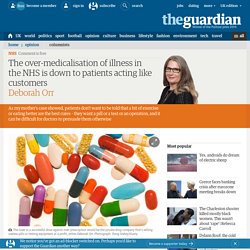
Every day for a short while, before she was admitted to hospital and diagnosed with secondary renal cancer of the bone, she’d been jotting down the details of the painkillers she was taking and the time at which she was taking them, in a very shaky hand. These weren’t strong, addictive painkillers. They were paracetamol and ibuprofen. It was awful to imagine her sitting there, her face twisted with pain, watching the clock until it was time to get a smidgeon of relief from agony. Poor diabetes care in England 'costing lives' 13 January 2015Last updated at 21:32 ET By Michelle Roberts Health editor, BBC News online More than 3 million people in England have been diagnosed with diabetes Poor diabetes care in England is leading to avoidable deaths, record rates of complications and huge costs to the NHS, a charity is warning.
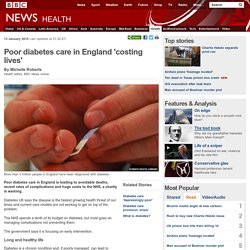
Diabetes UK says the disease is the fastest growing health threat of our times and current care models are not working to get on top of the problem. The NHS spends a tenth of its budget on diabetes, but most goes on managing complications not preventing them. The government says it is focusing on early intervention. Long and healthy life Diabetes is a chronic condition and, if poorly managed, can lead to devastating complications, including blindness, amputations, kidney failure, stroke and early death. Continue reading the main story “Start Quote End QuoteBarbara Young, Diabetes UK chief executive But official audits of NHS care in England show many patients do not receive these checks. Check-ups.
Nearly 50% take prescription drugs. 10 December 2014Last updated at 05:14 ET By James Gallagher Health editor, BBC News website Half of women and 43% of men in England are now regularly taking prescription drugs, according to the comprehensive Health Survey for England.
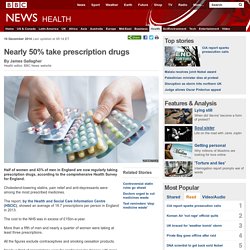
Cholesterol-lowering statins, pain relief and anti-depressants were among the most prescribed medicines. The report, by the Health and Social Care Information Centre (HSCIC), showed an average of 18.7 prescriptions per person in England in 2013. The cost to the NHS was in excess of £15bn-a-year. More than a fifth of men and nearly a quarter of women were taking at least three prescriptions. All the figures exclude contraceptives and smoking cessation products. Nearly a third of prescriptions were for cardiovascular disease with more than 65 million prescriptions for tackling high blood pressure, heart failure or cholesterol levels. Simvastatin - which lowers cholesterol - was the single most prescribed item with 40 million prescriptions. Getty Images Heart Obesity. If people are to manage their own conditions they'll need wider support beyond their GP.
Over the past few years there has been a push towards getting patients with long-term conditions such as diabetes to take on more responsibility for their conditions.
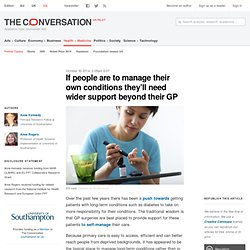
The traditional wisdom is that GP surgeries are best placed to provide support for these patients to self-manage their care. Because primary care is easy to access, efficient and can better reach people from deprived backgrounds, it has appeared to be the logical place to manage long-term conditions rather than in more expensive out-patient clinics. Take diabetes, for example. If you have the condition, your GP practice will call you in for regular checks and discussions about how well you are managing your condition.
This support will include information and advice on diet and weight loss, exercise and how you’re managing any medicines. Are we becoming nation of 'happy pill poppers?' Wednesday August 1 2012 Prozac and Seroxat are two widely prescribed antidepressants The UK is in the grip of a ‘happy pill boom’ according to the Daily Mail, with ‘almost 50 million’ antidepressants prescribed in 2011.
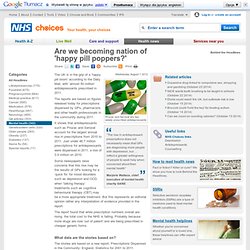
The reports are based on figures released today for prescriptions dispensed by GPs, pharmacists and other health professionals in the community during 2011. It shows that antidepressants such as Prozac and Seroxat account for the largest annual rise in prescriptions from 2010 to 2011. Just under 46.7 million prescriptions for antidepressants were dispensed in 2011, a rise of 3.9 million on 2010. Some newspapers raise concerns that this rise may be the results of GPs looking for a ‘quick fix’ for mood disorders such as depression and OCD, when ‘talking therapy’ treatments such as cognitive behavioural therapy (CBT) may be a more appropriate treatment. The report found that while prescription numbers overall are rising the total cost to the NHS is falling. They include: About Us. New Start was launched as the UK’s first regeneration magazine in February 1999.

Since then it has told the stories of the people and projects creating social and economic change in local areas in the UK and internationally. It has championed urban regeneration that is inclusive, sustainable and socially just. New Start has been part of Manchester-based Centre for Local Economic Strategies (Cles) since October 2010. Editor: Clare Goff Contact: 07545 609512 New Start publishes a weekly email bulletin and a monthly digital magazine.